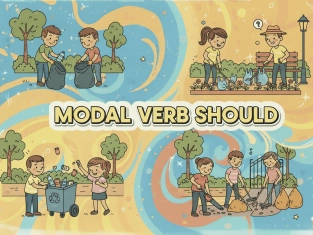Should vs Shouldn't
Table of Contents
Exercises
Explanation
When to Use “Should”
Use should when something is a good idea or the right thing to do.
You should drink more water every day.
He should call his parents more often.
We should help our classmates when they need it.
They should go to bed earlier on weekdays.
When to Use “Shouldn’t”
Use shouldn’t (should not) to talk about something that is a bad idea or a mistake.
You shouldn’t eat junk food all the time.
He shouldn’t watch TV before his exam.
We shouldn’t be late for school.
They shouldn’t argue with their teacher.
Quick Comparison
|
Use |
Meaning |
Example |
|
Should |
Good idea / advice |
You should save some money. |
|
Shouldn’t |
Bad idea / warning |
You shouldn’t waste your time. |
Form
|
Type |
Structure |
Example |
|
Affirmative |
Subject + should + verb |
You should listen carefully. |
|
Negative |
Subject + shouldn’t + verb |
You shouldn’t talk loudly. |
|
Question |
Should + subject + verb? |
Should I take an umbrella? |
Tip
-
Should = suggestion → You should try this dessert!
-
Must = rule → You must wear a helmet when riding a bike.

